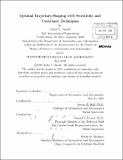Optimal trajectory-shaping with sensitivity and covariance techniques
Author(s)
Small, Todd V. (Todd Vincent)
DownloadFull printable version (13.70Mb)
Other Contributors
Massachusetts Institute of Technology. Dept. of Aeronautics and Astronautics.
Advisor
Steven R. Hall and Ronald J. Proulx.
Terms of use
Metadata
Show full item recordAbstract
Traditional trajectory design approaches apply optimal control techniques to maximize desired performance, subject to specified constraints. Normal metrics and constraints are composed of the deterministic states and controls in the plant dynamics, so classical design methods do not directly address trajectory robustness in the presence of system uncertainties. This work explores the introduction of uncertainty directly into the trajectory design process. The state transition (sensitivity) and covariance matrices both measure the impact of plant uncertainty, and each of these mathematical constructs can be adjoined to the trajectory optimization problem to generate solutions that are less sensitive to prevalent uncertainties. A simple Zermelo boat problem is used to compare the methodologies for any combination of state initialization errors, state process noise, parametric biases, and parametric process noise, under any predefined feedback control law. The covariance technique is shown to possess several advantages over the sensitivity technique. Subsequently, the covariance method is used to simultaneously design reference trajectories and feedback control laws with closed-loop performance constraints for the Zermelo problem. The covariance trajectory-shaping technique is then applied to a generic hypersonic recoverable reentry vehicle. The trajectories include uncertainties in atmospheric density, axial and normal force coefficients, commanded attitude, and initial position and velocity. Reachability footprints with uncertainty bounds are generated by the trajectory-shaping methodology, and shown to extend the vehicle's range of confidence. Relative to a fixed recovery site within the footprint boundary, the covariance technique improves the circular error probable (CEP) radius by almost 50%. Lastly, by segmenting the problem, trajectory designs successfully reach the recovery site using a balance of dispersion penalties and maximum intermediate maneuvers. Improvements in final CEP are shown to require sacrifices in planned maneuvering.
Description
Thesis (S.M.)--Massachusetts Institute of Technology, Dept. of Aeronautics and Astronautics, 2010. Cataloged from PDF version of thesis. Includes bibliographical references (p. 129-130).
Date issued
2010Department
Massachusetts Institute of Technology. Department of Aeronautics and AstronauticsPublisher
Massachusetts Institute of Technology
Keywords
Aeronautics and Astronautics.